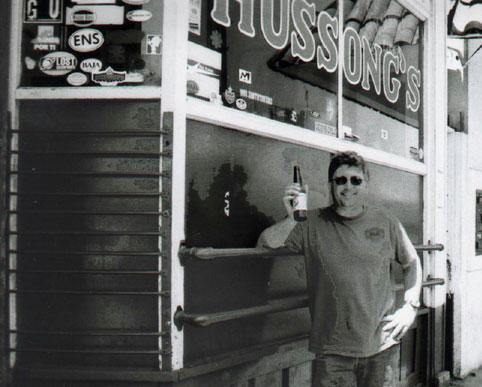AN INTERVIEW WITH THE DEMON DOG OF CRIME FICTION
AB: My Dark Places must be a book you'd thought about writing for years.
JE: Yes and no. Obviously the subject was on my mind, but the impetus was when a friend of mine, Frank Girardot of the San Gabriel Valley Tribune, called me up and said he was going to open my mother's file in preparation for a piece on five unsolved San Gabriel murder cases. As soon as he told me, I thought, Shit, I've got to see that file. I called my GQ editor and asked him if I could write five thousand words on seeing my mother's murder file. It was a shocking experience, as you can imagine. That's when I realized I needed to deal with this subject in a book.
AB: There's a technique you use in My Dark Places - when you start to build a point to a revelation, the sentences get shorter, quicker, you build momentum.
JE: That was deliberate, at least in one section of the book. I wanted the reader to feel what I felt each time I was close to finding something out. I guess I was like a baseball pitcher changing speeds.
AB: There's a picture in the book that's startling. It shows you seconds after you heard of your mother's murder. How did you get it?
JE: My wife dug that out of the Los Angeles Times archives. She had it framed and gave it to me for Christmas [in 1992]. When I opened the package, a rush of memories came back. I thought, This is me at ground zero. I hadn't seen pictures of me as a kid in years. There I was at ten at the moment when my life went blurry.
AB: In your youth you were Into all sorts of pseudo-Nazi stuff, but you dumped all that when you grew up.
JE: I knew that was all bullshit even as a kid, but it had shock value; it got attention. As I got older, I came to realize I'm just not a hater.
AB: Do you hate the man who killed your mother? Is it possible that if you got past that, you'd lose the itch to explore the criminal impulse?
JE: If I could walk the guy to the gas chamber and drop the pellet myself, I'd feel good about it. But I'll never lose the urge to write about crime.
AB: Despite everything, you're happy?
JE: Hey, because of everything I'm happy. I've got a great marriage, a great career, and I'm living in a great town. I'm writing some great books. I'm having a fucking blast.
FROM: Brant Publications, Inc. 1996
Wednesday, December 25, 1996
Subscribe to:
Posts (Atom)
